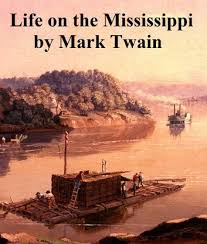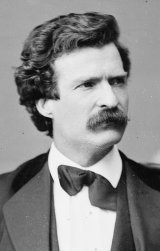Life on the Mississippi Page #3
Life on the Mississippi is a memoir by Mark Twain of his days as a steamboat pilot on the Mississippi River before the American Civil War. It is also a travel book, recounting his trip along the Mississippi River from St. Louis to New Orleans many years after the war.
On the 17th of June, 1673, the canoes of Joliet and Marquette and their five subordinates reached the junction of the Wisconsin with the Mississippi. Mr. Parkman says: 'Before them a wide and rapid current coursed athwart their way, by the foot of lofty heights wrapped thick in forests.' He continues: 'Turning southward, they paddled down the stream, through a solitude unrelieved by the faintest trace of man.' A big cat-fish collided with Marquette's canoe, and startled him; and reasonably enough, for he had been warned by the Indians that he was on a foolhardy journey, and even a fatal one, for the river contained a demon 'whose roar could be heard at a great distance, and who would engulf them in the abyss where he dwelt.' I have seen a Mississippi cat-fish that was more than six feet long, and weighed two hundred and fifty pounds; and if Marquette's fish was the fellow to that one, he had a fair right to think the river's roaring demon was come. 'At length the buffalo began to appear, grazing in herds on the great prairies which then bordered the river; and Marquette describes the fierce and stupid look of the old bulls as they stared at the intruders through the tangled mane which nearly blinded them.' The voyagers moved cautiously: 'Landed at night and made a fire to cook their evening meal; then extinguished it, embarked again, paddled some way farther, and anchored in the stream, keeping a man on the watch till morning.' They did this day after day and night after night; and at the end of two weeks they had not seen a human being. The river was an awful solitude, then. And it is now, over most of its stretch. But at the close of the fortnight they one day came upon the footprints of men in the mud of the western bank--a Robinson Crusoe experience which carries an electric shiver with it yet, when one stumbles on it in print. They had been warned that the river Indians were as ferocious and pitiless as the river demon, and destroyed all comers without waiting for provocation; but no matter, Joliet and Marquette struck into the country to hunt up the proprietors of the tracks. They found them, by and by, and were hospitably received and well treated--if to be received by an Indian chief who has taken off his last rag in order to appear at his level best is to be received hospitably; and if to be treated abundantly to fish, porridge, and other game, including dog, and have these things forked into one's mouth by the ungloved fingers of Indians is to be well treated. In the morning the chief and six hundred of his tribesmen escorted the Frenchmen to the river and bade them a friendly farewell. On the rocks above the present city of Alton they found some rude and fantastic Indian paintings, which they describe. A short distance below 'a torrent of yellow mud rushed furiously athwart the calm blue current of the Mississippi, boiling and surging and sweeping in its course logs, branches, and uprooted trees.' This was the mouth of the Missouri, 'that savage river,' which 'descending from its mad career through a vast unknown of barbarism, poured its turbid floods into the bosom of its gentle sister.' By and by they passed the mouth of the Ohio; they passed cane-brakes; they fought mosquitoes; they floated along, day after day, through the deep silence and loneliness of the river, drowsing in the scant shade of makeshift awnings, and broiling with the heat; they encountered and exchanged civilities with another party of Indians; and at last they reached the mouth of the Arkansas (about a month out from their starting-point), where a tribe of war-whooping savages swarmed out to meet and murder them; but they appealed to the Virgin for help; so in place of a fight there was a feast, and plenty of pleasant palaver and fol-de-rol. They had proved to their satisfaction, that the Mississippi did not empty into the Gulf of California, or into the Atlantic. They believed it emptied into the Gulf of Mexico. They turned back, now, and carried their great news to Canada. But belief is not proof. It was reserved for La Salle to furnish the proof. He was provokingly delayed, by one misfortune after another, but at last got his expedition under way at the end of the year 1681. In the dead of winter he and Henri de Tonty, son of Lorenzo Tonty, who invented the tontine, his lieutenant, started down the Illinois, with a following of eighteen Indians brought from New England, and twenty-three Frenchmen. They moved in procession down the surface of the frozen river, on foot, and dragging their canoes after them on sledges. At Peoria Lake they struck open water, and paddled thence to the Mississippi and turned their prows southward. They plowed through the fields of floating ice, past the mouth of the Missouri; past the mouth of the Ohio, by-and-by; 'and, gliding by the wastes of bordering swamp, landed on the 24th of February near the Third Chickasaw Bluffs,' where they halted and built Fort Prudhomme. 'Again,' says Mr. Parkman, 'they embarked; and with every stage of their adventurous progress, the mystery of this vast new world was more and more unveiled. More and more they entered the realms of spring. The hazy sunlight, the warm and drowsy air, the tender foliage, the opening flowers, betokened the reviving life of nature.' Day by day they floated down the great bends, in the shadow of the dense forests, and in time arrived at the mouth of the Arkansas. First, they were greeted by the natives of this locality as Marquette had before been greeted by them--with the booming of the war drum and the flourish of arms. The Virgin composed the difficulty in Marquette's case; the pipe of peace did the same office for La Salle. The white man and the red man struck hands and entertained each other during three days. Then, to the admiration of the savages, La Salle set up a cross with the arms of France on it, and took possession of the whole country for the king--the cool fashion of the time--while the priest piously consecrated the robbery with a hymn. The priest explained the mysteries of the faith 'by signs,' for the saving of the savages; thus compensating them with possible possessions in Heaven for the certain ones on earth which they had just been robbed of. And also, by signs, La Salle drew from these simple children of the forest acknowledgments of fealty to Louis the Putrid, over the water. Nobody smiled at these colossal ironies. These performances took place on the site of the future town of Napoleon, Arkansas, and there the first confiscation-cross was raised on the banks of the great river. Marquette's and Joliet's voyage of discovery ended at the same spot--the site of the future town of Napoleon. When De Soto took his fleeting glimpse of the river, away back in the dim early days, he took it from that same spot--the site of the future town of Napoleon, Arkansas. Therefore, three out of the four memorable events connected with the discovery and exploration of the mighty river, occurred, by accident, in one and the same place. It is a most curious distinction, when one comes to look at it and think about it. France stole that vast country on that spot, the future Napoleon; and by and by Napoleon himself was to give the country back again!--make restitution, not to the owners, but to their white American heirs.
Translation
Translate and read this book in other languages:
Select another language:
- - Select -
- 简体中文 (Chinese - Simplified)
- 繁體中文 (Chinese - Traditional)
- Español (Spanish)
- Esperanto (Esperanto)
- 日本語 (Japanese)
- Português (Portuguese)
- Deutsch (German)
- العربية (Arabic)
- Français (French)
- Русский (Russian)
- ಕನ್ನಡ (Kannada)
- 한국어 (Korean)
- עברית (Hebrew)
- Gaeilge (Irish)
- Українська (Ukrainian)
- اردو (Urdu)
- Magyar (Hungarian)
- मानक हिन्दी (Hindi)
- Indonesia (Indonesian)
- Italiano (Italian)
- தமிழ் (Tamil)
- Türkçe (Turkish)
- తెలుగు (Telugu)
- ภาษาไทย (Thai)
- Tiếng Việt (Vietnamese)
- Čeština (Czech)
- Polski (Polish)
- Bahasa Indonesia (Indonesian)
- Românește (Romanian)
- Nederlands (Dutch)
- Ελληνικά (Greek)
- Latinum (Latin)
- Svenska (Swedish)
- Dansk (Danish)
- Suomi (Finnish)
- فارسی (Persian)
- ייִדיש (Yiddish)
- հայերեն (Armenian)
- Norsk (Norwegian)
- English (English)
Citation
Use the citation below to add this book to your bibliography:
Style:MLAChicagoAPA
"Life on the Mississippi Books." Literature.com. STANDS4 LLC, 2025. Web. 8 Mar. 2025. <https://www.literature.com/book/life_on_the_mississippi_241>.








Discuss this Life on the Mississippi book with the community:
Report Comment
We're doing our best to make sure our content is useful, accurate and safe.
If by any chance you spot an inappropriate comment while navigating through our website please use this form to let us know, and we'll take care of it shortly.
Attachment
You need to be logged in to favorite.
Log In